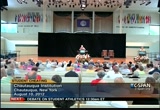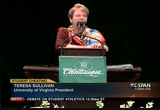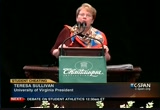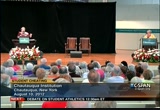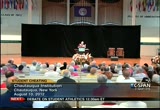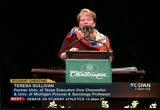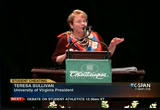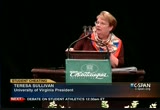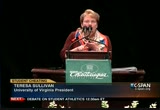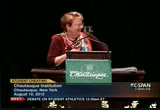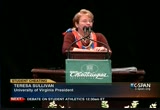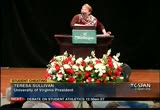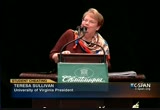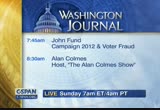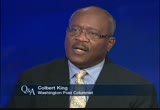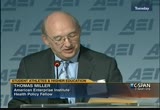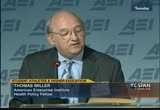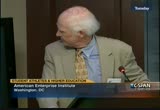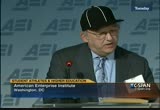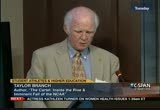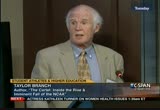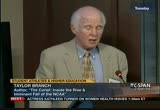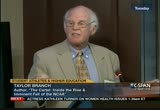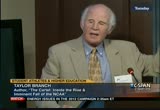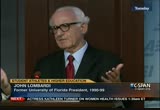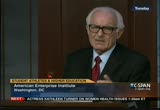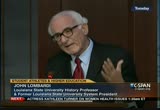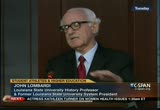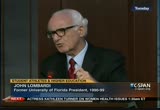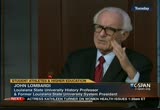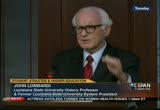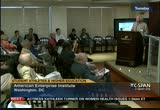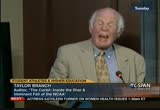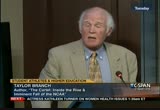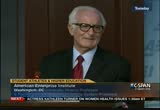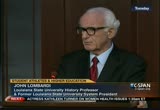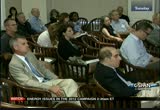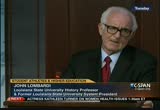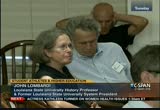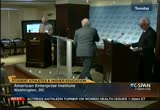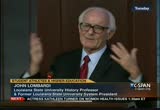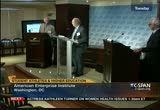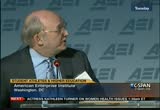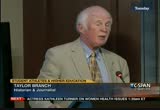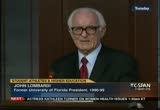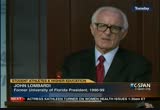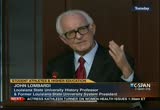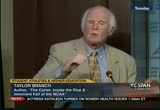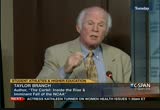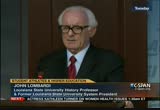tv Debate on College Sports CSPAN September 9, 2012 12:15am-1:15am EDT
12:15 am
of due process. eventually, the student receives a letter that says your transcript will note that your degree has been revoked and you may not represent yourself as a graduate of the university of virginia. that is it. for a student who is expelled in the course of study, we will try to help them relocate to another college or university on the theory that, although they have broken trust with our community, they deserve to have a second chance at another community. we explain the circumstances and the of the college has to understand and accept them. >> how does the academic honor could translate into issues of alcohol and drug abuse and date rape? >> that is a great question. i would like to say that students are perfectly congruent in their behavior when they are on the university grounds and when they are not. but that is not true.
12:16 am
we still have problems with both drug abuse and alcohol abuse, which students tend not to see as falling within the lie, cheat, steal continuing. students do not -- i think most faculty members would. one other area in which i think we have a real difference of opinion in terms of is downloadg copyrighted material. many of our students do not see that as stealing. they don't understand why we do. so, there are areas where we have struggle over the moral high ground. that is true in virginia as it is elsewhere. >> how do university presidents maintain and safeguard what should be their absolute authority over head coaches and athletic directors?
12:17 am
[applause] >> gee, i wonder why that question came up. when i came to uva, i changed the report in line of the athletic director so he reports directly to me, which did not happen in the previous administration. i thought i needed to know what was going on in the athletic program. i also make it a habit to sit down with the head coaches and talk with them one-on-one about the issues they have, and also my expectations for the academic program their student athletes follow. i found the coaches welcome this, enjoy talking to me about it, and i will tell you about my last such interview with mike london, our third-year head football coaching. -- coach. i sat down with him. he said, do you think you'll be
12:18 am
changing the times class is made? i said i did not think we would need to do that. he said, i went to meet the registrar. i made a mental note, head coach knows where registrar is. he asked to see how many glasses were being offered at every hour. what i saw was that, because we were having practiced in the afternoon, my guys were being cut out of electives they wanted to take. there were few classes offered at 8:00 in the morning. we moved practice from the afternoon to 8:00 a.m. the guys all have to be there for breakfast at 6:30, and by 10:00, they're finished and ready to go to class. they have the highest gpa the football team has had. the coach often visits classes
12:19 am
the players are supposed to be in. if they are not there, bad news for them. they will do extra physical exercise. i think he communicates that their students first and then athletes. he brings me to meet to the recruits -- meet the recruits and their parents. the parents are particularly interested in what i have to sit. my message to the parents is, look, when you leave this place, people can take away your job, they can take away your car, they can take away your house, but they cannot take away your education. that is what we want your young men to get all they are here. it is great if they have a wonderful playing career, if they want to go professional, god bless them, but it is important they leave here with a degree. athletes who have exhausted eligibility are graduating at a rate of 93%. [applause] >> how do you protect
12:20 am
whistleblowers? >> really good question. one of the problems, retaliation can often be subtle. what you want to do is protect the subtle kinds of retaliation. when i hear something, and i will say, people who are whistle-blowers will often e- mail me directly or copy me on any now they have sent to somebody else. the first thing i do with that is to send it to the general counsel's office. i want to preserve the rights of the whistle-blower against retaliation. i think letting people know that that is what you will do is really your best policy. i will also say sometimes people falsely claim whistleblowing because they are in a genuine discipline problem over something they have done in the workplace, and they want to use this as a rationalization. there are people who do need that protection. >> for three years in college, my father proofread and edited
12:21 am
my papers. i never thought of this as treating and highly doubt he did. what do you think? >> i think it depends on the professor. in my own glasses, i say to students, it is fine with me if you consult with librarians are writing tutors or others, people who edit your work or give your suggestions about writing. i don't have a problem with that. but, the ideas and the final expression of those ideas, must be your own. in my class, that would not have been cheating. one of the things that is important is professors have to explain what their expectations are to the students. a problem we see pretty often happens in engineering class is for the students have been divided up into workgroups through the semester, then you get to the final exam, and a professor understands that is to be independent work, but the students understand they can still work with their groups. those conflicting assumptions need to get addressed.
12:22 am
we try to actually spend time training faculty as well as students about the honor code. the faculty know they have a serious responsibility to explain to students what they consider to be dishonest in this class. >> could you comment on grade inflation? isn't that a form of teacher cheating? is somethingation people of traced to the vietnam war. there's a fear that people who flunked out of college would immediately get drafted. i think it also had something to do with how good the quality of the entering students is. they genuinely are getting better. at least some faculty also are seeking to take a mastery approach to the class. they want everybody in the class to learn the spanish conjugations. they want everybody to learn the calculus. they're willing to give students lots of rehearsal and practice to get them to that level of
12:23 am
mastery. that may mean the grades will be higher in that class and otherwise. sometimes, faculty members are lazy about their grading. when they are, they're not giving students the preparation they need to go out in the world. shoddy work is not well received in the marketplace. a student to consistently submits shoddy work and gets a good grade for it is being sent the wrong message about what the world is like. i will say that it is not the complaint i get. i never got anything below an a in my life. what do you mean i am getting -- ? >> is there a gender difference among cheaters? women are far less likely to cheat. they appear to be moving up, so
12:24 am
to speak. men are still ahead in terms of those who admit to cheating. >> hard-working with your fraternities to emphasize honorable behavior? >> question. i had a meeting with the presidents of the fraternity this spring. in virginia, hazing is against the law. the university president is required to inform the, the attorney of the president is aware of an incident of hazing. i informed the printer -- the president that i had the, fraternity on speed dial and there would be no question if i heard about something that sounded like hazing, i would turn them in. we had a serious discussion about what membership is and what pacing is. no one is willing to put up with facing these days. all alumni from their fraternity talk about what it is like in the old days.
12:25 am
we had a very frank discussion about hazing. a lot of them knew the right thing to do. we had a good discussion about leadership. part of that leadership is academic integrity. i do think the honor code is prized by the members of our fraternities. i think we probably got somewhat less of an issue of the paternity test file, were all the tests are passed from brother to brother. i would not say it never existed. i also meet with the presidents of the sororities. i have a somewhat different message for them. the behavior of worry about with sorority women is their lack of awareness when they are walking alone past midnight. when the bars closed at 2:00, there are a certain number of
12:26 am
young women who would walk alone to their sorority house. even in charlottesville, which is pretty safe, that is not a completely safe behavior. that message was, people should walk in groups at night and not alone. it is for your own protection. we also talked about leadership with them. they also have their own issues. in terms of behavior problems, fraternity outrority almost any day of the week, especially saturday. >> why do so many colleges require essays on their application when it is so easy to cheat on? >> that is a really good question. you sometimes look of the students in -- student and say, how did you get admitted? who wrote that for you? we have fought to overcome that with the writing portion of the s.a.t. it is done in the testing environment. you don't have the opportunity.
12:27 am
some colleges have started evaluating that one more rigorously in terms of writing ability. the essay is also used for the student to reveal something about their background that does not appear in the application anywhere else. so, it is read as a way to learn more about the students as to learn about their writing ability. i agree that the notion of carefully tailored and edited and prepackaged essays is a real problem. >> how can we get an honor code for our politicians? [laughter] [applause] >> that is a great question and i wish i knew the answer. i think it is very difficult in today's political climate. i admire the people willing to
12:28 am
run for political office today because the vilification starts immediately. it is so personally destructive. thomas jefferson had the same problem in his election. as a result, he stopped reading newspapers in his second term as president. it is not a new problem with us. the notion of exaggeration if not downright lying, i think, is a real issue. i noticed some journalists have come to our assistance by producing truth meters in which they assess the relative degree of truth, or truthiness, of various political ads. that is one way we can try to put a check on the politicians. i agree we have a serious issue with it. >> last question, how can we as parents or grandparents create an honor code in your family? >> that is a great question. you know, i think one of the best things you can do is to talk with children and
12:29 am
grandchildren about what is important and why. it is important to us that the engineers were honest in the building bridges. otherwise, the bridges will fall in. it is important to us that the people we work for are honest in terms of payroll. we can get the money we need to get groceries. there are lots of ways a young child can understand why being honest is important. young children are often bothered by dishonesty and would like to talk to about it, but if you have not legitimate to the conversation, they won't bring it up. people like to follow baseball but they are troubled about steroid use. they see that as teaching but they don't know if it is ok to talk about that because sports writers and others seem not to want to address a straightforwardly. you as a parent certainly can. i think talking about things that have happened in the press
12:30 am
that raise issues of integrity or honor is a great way to get kids thinking along those lines. of course, if you have an option in terms of where they go to school, you can talk to the school administrators about how they inculcate the culture of integrity and what their policies are. these ways are very effective. a show by your own behavior that it is important to you. it might be the single best thing you can do. i thank you very much for being such a wonderful audience. [applause] >> the first of the presidential debates. what and in case. next, a debate on student-
12:31 am
athletes in higher education. that act as kathleen turner on women's health and reproductive rights. then a discussion about energy issues and the 2012 campaign. tomorrow on washington journal, a discussion about voter fraud would john fund, co-author of who is counting, how bureaucrats pleader votes at risk. fox news radio host alan -- offers his perspective. steve cook talks about u.s. aid to egypt. washington journal, live at 7:00 a.m. eastern on c-span. >> i am angry. it is offensive. to have people take on the position of public trust and an abuse it. and to do it in such a way to almost thumb their noses.
12:32 am
to me this is the other thing that is bothersome. i am a journalist. my job is to do what i do and you do you do. but they turn to their supporters. people who say the government is wrong, they are lying, they are out to get me. they are doing it because i'm black. the use of those arguments and supporters believe them. to me that is despicable. >> sunday night, pulitzer prize winner colbert king looks at corruption in the district of columbia's government at 8:00 on c-span. now the american enterprise institute debate. the author of the cartel's indicates the former louisiana state university president on whether the ncaa has lost a
12:33 am
constant -- concept of student athletes. this is an hour. this is an hour. >> gooevening and welcome to the american enterprise institute. tonight, we >> good evening and welcome to the american enterprise institute. tonight, we are featuring a special american enterprise debate. the advertisement refers to it as a student athlete reality check. the official debate question, which is what we will frame here, is the n.c.a.a. promoting education and amateurism in major division one sports programs, and if not, what is our response to be? we have -- let me introduce myself. i am tom miller with the american enterprise institute. all i was a one-time sports caster. i am volunteering tonight. i'm not being paid anything extra by aei to do this. no under the table payments.
12:34 am
we have two excellent debaters tonight. i do have to give you full disclosure. i did attend duke law school. it was put on probation and a basketball when a booster provided travel assistance to david thompson. we went on probation for your and we did not fit to recruit. -- we went on probation for a year and we did not get to recruit. we have dr. john lombardi, a professor of history at louisiana state university. he previously served in a number of academic roles, president of the lsu system, president of the university of florida, and provost of johns hopkins university. he is the author of dozens of books and articles. he served on many committees to
12:35 am
advance the reform of collegiate structures in athletics and the n.c.a.a.. we also have taylor branch. he is the pulitzer prize-winning journalist. he has a three-volume chronicle of the life of martin luther king jr. called "america in the king years." he is also more recently -- if we can get that up there on the screen -- is called "the cartel," which dispels corruption within the n.c.a.a. and what might be done to remedy it. we will just go briefly over the basic ground rules for tonight. they should not be that complex. i should tell you, i am not really a speaker tonight. i am just an official. [laughter] a timekeeper to enforce the rule. let's go through some of that. the opening statements will be eight minutes each.
12:36 am
if anybody goes over, we will enforce those quite seriously. the responses will be five minutes each. if anyone says anything a little on toward -- untoward, there will be penalties to be assessed afterward. then we will have some q&a from the audience. you should be able to see on the screen. i can tell you as well. you can send your questions in advance to was. you can send them by way of the e-mail. aeidebates@aei.org. or, by twitter. #aeidebates. i believe that we have a coin flip before hand in order to economize on television time and get an extra commercial, but my understanding is taylor branch won the toss.
12:37 am
he has elected to receive. dr. lombardi will be defending the bill to your right and my immediate left. we will get started. it should be a great time. thank you. [applause] >> thank you, tom, and thanks to aei. i'm happy to engage in this discussion to get thought on the table on an issue that i think affects not only the government of sports but a growing crisis within higher education itself, over governance, how we think, how we regulate, how we define a potential bubble. all of higher education is having some trouble in many respects, and i think a good way to think about it is to focus on college sports.
12:38 am
aei is in a proper place to have this debate. in one sense, it could be seen as a conflict between two core conservative principles, the free-market to govern how college board's works with and higher education, as george will said, or as was the alternatives, the conservative principle is that some things are more important in the market. aristocracy, amateurism, that sort of thing, was the point view taken in "the new york times." the free market makes some sense, but some values are more important. amateurism is one of them. i'm honored to be with dr. lombardi. he is not only fellow historian, but he has written a lot more on this issue then i have. i kind of stumbled into this by trickery to do a short history of college sports in america.
12:39 am
this is definitely a sideline for me. he is president of universities and he was the provost at johns hopkins in baltimore, where i live. i have to honor him for that. he is ranked number three in the college football poll at lsu. he knows what he's talking about. he has practical experience. i have none. he is a reformer within the world of college sports. specifically, dr. lombardi has recently advocated that the scholarship level for athletes be raised, which is anathema to the smaller schools that feel they cannot afford it. he is also more significantly advocating that scholarships be guaranteed for athletes for their entire four years, which is even more anathema to big- time coaches who want the year by year scholarship roll to give them more control over the athletes. finally, he is also an advocate
12:40 am
of reform in n.c.a.a. rules that capture in come from the sale of sports memorabilia and everything foreign athletes entire lifetime, long after they leave school. that is the issue in the antitrust case that is working its way through the courts right now. he is a reformer on that as well, all of which would cause havoc with in the world of college sports. i admire him for that. but, he said every reform needs to be done within the bedrock principle of amateurism. i don't want to mince words. there are lots of things in reform of college sports about the governments of sports and
12:41 am
how they should be done, and the balance, and what the faculty should do, and so forth. we can agree on all of those. on must be at least think about amateurism and what it -- unless we at least think about amateurism and what it means, all of this discussion is wasted breath. amateurism, in my view, is a bogus conceit that can only exist in the sport because it has a long history and because part of the purpose of sports is that we don't have to think too hard. the purpose is to cheer and boo. that is what happens when we have contempt and admiration for the athletes. we tell them to shut up and do whatever they want. we recoil from the notion of amateurism without thinking how unique, how weird it is in our society to impose amateurism without consent on one segment of our population. not all students, only the students who are playing sports. i contend that until we think about that and can state a rationale for it, we cannot even begin to have a productive conversation about sports reform, let alone higher education reform.
12:42 am
dr. lombardi says in one of his papers that the principle of amateurism is easy. if we sell student performance as part of the sanctions package of college sports, it is ok. if the students don't -- it is not ok. if he calls that a principle. i think it is a distinction. it is far short of a principle. it takes no rational, no foundation. when you try to get to the authority, when you poke into the authority of college sports, you get circular arguments or reflexive arguments, famously in "sports illustrated," michael rosenberg told of interviewing the former president of the n.c.a.a. and having the most circular interview of his whole career. they cannot be paid. why? because they're amateurs. what makes the managers? well, they cannot be paid. why not?
12:43 am
because they're amateurs. who decided they were amateurs? we did. why? because we don't pay them. this goes round and round. it is not based on anything except history and privilege. the principle of amateurism, and this is a quote, is an abdication -- advocation, this is in bed rules, student athletes should be protected from exploitation by commercial enterprises. that might roll into your consciousness easily, but surely, it is a little bit odd to say it exploits somebody to pay them rather than not to pay them. this is an alice in wonderland
12:44 am
notion that you are exploiting athletes if they receive any tangible benefits from the value that they sacrifice and work hard to create with extraordinary talent and effort. the whole world is upside down. it is an alice in wonderland world. in calling these athletes amateurs. if colleges wanted to be consistent, they would say all students are amateurs. graduate students cannot be paid. teaching assistant. students cannot work in the campus bookstore, cannot be cashiers, cannot moonlight, cannot take part in work study programs, cannot do any of that, cannot start a small business. cannot start facebook and become a billionaire when they are at harvard. we would never dream of applying those roles to students at large, only to this one small group of athletes.
12:45 am
you could not write a law, you could not going to a legislature to do this in any state in the world for good reason. it is a logical. you would be thrown out of court. you'd be laughed at. you cannot specify this. the n.c.a.a. says they cannot receive any tangible benefit and that their relatives cannot. their mother cannot get a christmas card from an agent. it exercises and assumes a level of control exercised only in north korea. amateurism is a sham. it is an unexamined principle. thank you. >> ok. thank you very much. i appreciate that. clear, straightforward. let me first say something. the first thing is, this notion
12:46 am
that the n.c.a.a. is a cartel is a problem for all of us because it makes us think the wrong way about the enterprise, it is sure to be the worst cartel in america because 99.5% of them lose money. it is not a cartel. it is a franchising organization. the n.c.a.a. is an organization the university's invented in order to be able to create a standardized product of collegiate athletics to have standardized rules, operations, activities so that all the universities to participate in the franchise can have the same standardized product. the difference is with mcdonald's, it is a standardized product of the franchise. we all have the same stuff to do.
12:47 am
a football fields are the same everywhere. rules are the same everywhere. we get to label it any way be blunt. we can put our name on it. we can promote it. we can sell it to our fans. we can do everything we want with the name pierre the product is a standardized product. the n.c.a.a.'s assignment is to maintain that standardized product so that we cannot participate in this common endeavor. we are looking at ohio state, texas, $140 million business. they're all playing the same games because they have the same standardized frame of reference. this is a very difficult thing to do. it is difficult because we invented this franchising system. there were not very many universities. the last 100 and some years, what has happened is the higher education business has exploded and expanded.
12:48 am
the franchise businesses had to rearrange the rules of how we do franchising to try and match these dramatic changes in higher education. they should be divided up into divisions. we have division ia, we tried to this case it -- tried to disguise it. now we have different levels of franchising operations. we still have the franchise. the challenge since day one has been that the people who like sports want to win. this is fundamental. they want to win. the other thing about people who want to win is, when you want banking, the securities business, people in america who want to win are willing to cheat in order to win. they're willing to do anything they can to win because they want to win. they will let this -- they will let them have standards and structures to reduce the amount of cheating that goes on to allow fair competition to take place.
12:49 am
people can feel like they are being watched on the basis of fairness. find an organization that has a better record of trying to maintain the structures. it is not the securities and exchange commission. it is not the regulation of the banking industry, which has collapsed under scandals. it does not the american bar association or the american medical association. they're doing pretty well. let me say something else. it is true that we have a big trouble maintaining what is amateurism. it is hard to maintain the amateur focus because everybody wants to make a buck off these big-time student-athletes. the problem is, the big-time student-athletes are a very tiny fraction of our franchise. very few. 430 student athletes in the franchise.
12:50 am
430,000 student athletes. that is a lot of kids. they're all playing in a franchise. we believe in this stuff. it is very hard to manage. what you watch when you watched the evolution of the n.c.a.a., and don't forget, this is about the universities, the universities are the franchise, whatever is done is because the universities, their presence, their trustees, faculty, regulatory agencies, everybody is in favor of what is going on. there is nobody opting out. nobody is opting out. people are raising their hands. they get filled with wisdom and justice and truth and they go off and say, we don't need to play anymore. they don't do that. everybody needs to have justice and truth, just like us, so we don't have under competition.
12:51 am
they just the rules of the franchise to make it work out. the first thing we should do is allow any student athlete who wants to go pro to go pro. why do we wait? why do we restrict them? why do we slow it down? they want to make high school and go pro. why is it our business to interfere? congratulations. go. explore. do the best you can. go out and the approach. make a gazillion dollars. high-school, they're not competitive. they come to us. we have a little bit of a minor league operation here. football does not want to do the minor league operation. we do it for them. we tried to give these kids a chance because we know so few of them will go pro. but the numbers. practically none of them go pro. the chance of going pro and making a career in professional football is tiny compared to the number of student athletes.
12:52 am
most of them make reasonable progress. we have instituted rules and regulations to try and increase the focus on academics. i am all for making a minor league in football. football is not interested in that. baseball has the minor leagues. large numbers of our students get recruited and they're gone. the go to the professional leagues. congratulations. the go to the minor leagues. they play minor league ball. you want to be a pro? go into that. you want to go to the stock market? sell stock appeared make money. i'm in favor of all that for students. i just ran out of time. >> five minutes? thank you. i would say the one model for a competitive enterprise that manages intense competition in athletics without disenfranchising the very people create the value is the
12:53 am
olympics. the international olympics used to consider college sports constituted because they allowed, scholarships. the olympics banned it and said there was a tremendous conflict. the olympics expunged the word "amateur" from its dialogue shortly after the 1978 law in the united states that required athletes to be on every governing committee for the 39 olympic committees. no one could look across the table until the athletes that they should be on food stamps because there would be banished for life, like jesse owens, if they got a nickel for competing in the sports. there are models. franchisees a nice notion. the n.c.a.a. is a cartel in the sense that th have artificial rules agreed to by the schools to
12:54 am
penalize anybody, any athlete, receives or any university grants one nickel above the agreed stipend. that is enormously significant. it is true. only 1% of the college athletes ever go pro. the flip side of that is that 99% of the athletes who have been devoting their lives to the sports and their bodies and are all beat up, the college experience is the only opportunity in their whole lifetime to get a nest egg out of the value they are creating. it is enormous. for one month, to run march madness, a cbs turner sports called -- paid directly $771 million for running the tournament. they paid the teams that participated in the tournament
12:55 am
and a subsidized the schools with what is left over after the n.c.a.a. takes its own cut, which is why there are construction cranes in indianapolis today, and private airplanes. all of this is because the athletes themselves don't get any of that money. the n.c.a.a. was terrified in the 1990's when there were rumors that one team might refuse to walk out on the court. national obsession. all the networks for their. $771 million at stake. this is generated by the rules of the n.c.a.a. that say that the students have no stake in their own enterprise. they cannot be members of the n.c.a.a.. they have no voice. they cannot vote appeared to have some rights. the structure is fundamentally unbalanced. look at it this way. for 1100 out of the 1200 n.c.a.a. schools, it did not matter particle if you -- we will no longer demonize students who ask for compensation for what they do.
12:56 am
i am not saying every student should be paid. i don't believe they should. i don't think they should be demonized for asking for compensation if they are producing enormous value, either. right now, 1100 schools support amateurism rules that benefit only the n.c.a.a. itself and the big-time schools like lsu that get to keep the money to hire more strength and conditioning coaches, and then have the gall to say, we're doing it for your own good so you can enjoy the blessings of amateurism. that is how it works. all the n.c.a.a.'s money comes from basketball. none comes from football because in 1984, the football schools went to the supreme court and said, it is on american.
12:57 am
the rule that was a cartel and struck down the n.c.a.a. rules. the n.c.a.a. has all licenses. they're struggling. that is what the football playoffs are all about their terrified that if this works, they can say, we cannot run march madness without the $707 million. there tremendous practical problems. underneath all of that, their basic problems of principle. athletes are excluded. you can see it in the penn state penalties the went down. everybody was saying that penn state was hit hard. logically, those penalties would have said, penn state has 20 fewer assistant coaches, 20 fewer assistance to the president, 24 assistance to the athletic director, all the people who failed and enabled.
12:58 am
instead, who did it penalized? scholarships for people who are still in high school and had nothing to do with it. that is because the n.c.a.a. concentrates all the power in precisely those offices that committed these crimes. >> i think one of the things that we need to pay attention to is this notion that struggling student athletes -- now, i know we are supposed to feel sorry for people who are given a full scholarship bride who have nothing but academics, who receive all of the equipment and travel and support, training support, available to anybody in the western world, and put them on a stage where they can display their talents in such joy that it increases, especially in football, their value, and in the going to the draft, which they can do it anytime. nobody stops them from going
12:59 am
into the draft. i don't feel sorry for t student athletes. i speak to my students in my classes and we talk about the way in which it is structured, the sport structure, and i say, what do you think about that? what do you think about the structure and what you get for being a participant in an extracurricular activity? let me think about that. i think it is a pretty damn good deal. it is a very, very good deal. sure, we're already paying them. we can increase the amount. we have to figure out how we're going to pay them. i think what we ought to do is pay something like tim tebow $5 million a year. i think that is reasonable. i think that is the way we ought to deal with students. i think what we try to do is run the university with a reasonable amount of fairness as best we can.
1:00 am
we try to support what it is we do. this is not a simple business. this is an expensive business. all of these programs, except for a few, 20 at most, in the division ia, are losing money. they're supporting the sports that are not on television, track and field, olympic sports, tennis, all this stuff. we can say we don't like the way the system is organized because it transfers money from the big money sports to the small money sports. it is a transfer process. this is what we do in america. graduated income tax. the american enterprise institute probably thinks that is a bad idea. it here, that is what we do. we transfer money from the people were making a to support the people who are not making it because the franchise businesses organized as a program.
1:01 am
the concept of intercollegiate athletics is that we support a program that has a defined number of sports. you have to have all of the sports to participate in the franchise. that means you cannot put all your money on football or basketball or whatever your big- time sport is. you have to support the mom. the level of support you have to provide is part of this process. create programs that support the extracurricular activities of the students. they're getting a pretty good deal. i don't like to fill sorry for them. i don't feel sorry for them. we had an honor student at the university. he does not have as good of the scotia. if they do not make a b average, he loses his scholarship. maybe there should be a four- year scholarship. four-year scholarship for student athlete, i don't have any problem with that.
1:02 am
the program will not pick up the cost. the program will not pick up the cost. it will be picked up someplace else in the u it will be picked up someplace else in the university. we can make it better. we could say we really don't want to have this competition the way it is. our student athletes actually be students. we don't want to try to keep them in class or try to keep them eligible. we don't need to do that. we want to pay them for performance. we provide support. they can play and participate in the activities of university. could it be better? sure, it could be better. the franchise is increasingly increased. lot to saye a whole
1:03 am
about this argument. i think there's something to be said about a lawsuit for those who are using images in the future. that is what they ought to discuss. i think the enterprise has to continue to get better every single year. it has to keep responding to the changes taking place in the environment. let me say, any of you who watch intercollegiate sports on television, you are the cause of all of this money. [laughter] >> that is quite an opening round. we have some questions from our audience coming in my e-mail and by twitter. given that we have about 20 minutes, we probably will not be taking more than the ones we have already digested. one of the questions was asking the basic issue, given how much
1:04 am
that universities are under fiscal pressure, making ends meet for an expensive enterprise, how realistic is reform of what is one of the more positive revenue-generating sources of a college within the limits of the bottom line? >> i cannot seem to get this through anybody's head. hardly anybody makes any money from intercollegiate sports. we don't do intercollegiate sports to make money. we make money so we can do as much with intercollegiate sports as we possibly can appear there 22 programs out of 1100 that make money here the rest of them are losing their shirts to varying degrees. the percentage by which they are losing their shirts has not changed a whole lot. on the average, it runs at about 5%. i have got to tell you, the idea that we do sports to make money is like saying we do research to make money. both of them lose money.
1:05 am
we do them for the reasons. the reason we do them as not to make money. we want to make as much money as possible for intercollegiate sports to subsidize the deficit and make the deficit less than it would otherwise be. there is no way we will make a profit on intercollegiate sports and solve the budgetary problems that most universities. quite the contrary. as we lose more and more money in intercollegiate sports, it will put more pressure on the universities to try and do something about the cost structure of intercollegiate sports. >> the "side of that is, basically, if there is not the revenue gusher from the major sports, or it is being paid to the players, the revenue transfer, what happens to the rest of the college sports program without that subsidy? >> you confront that question honestly and straightforwardly with all the stakeholders having a say in it rather than the way it is done now, which is by --
1:06 am
what it does is it creates -- we have a casino mentality where money comes in from the big revenue sport and a softball coach comes in and says, you get all this money, i want part of it. you have $300,000 softball coaches. lists everything, but it is all artificial, phony, and off the backs of the revenue athletes without their consent. >> dr. lombardi talked about one alternative, which is basically, pay the superstar is a lot of money. it is almost like having a franchise player, in the nfl, their free agents. what is the alternative structure for compensation? we will have collective bargaining. will we have a minimum salary with in the players? people can get bonuses if they do special things? what would be an alternative structure where some of the money came back to those performing on the field? >> the alternative structure is simple. you say amateurism no longer exists, and everybody has to
1:07 am
deal with the consequences openly. athletes can come in. the volleyball player can say, i want $10,000 above my scholarship and the university is free to laugh. the system would otherwise dissolve naturally. the way it is now, every one presumes we must be satisfied the system is there before we give rights to the people who are producing all the value and risking their lives. it does not make sense. the change is simple. acknowledge that amateurism is bogus. it has been grafted on from the 19th century when amateurism and we are all gentleman and we won't allow anybody from the working trades to participate in the olympics. when tv money started generating millions, we said it was an excuse to control the system and essentially say, we colleges cannot afford not to rob these athletes. that is basically what it boils down to. i cannot get anybody to say what is the foundational justification for imposing amateurism on people without
1:08 am
their consent. >> dr. lombardi seemed to suggest that the n.c.a.a. is only exploiting a few. maybe the superstars, who could make more money, and that benefits others. you seem to be saying you are exploiting quite a lot of them -- athletes. >> i don't think that is true. i don't think we are in the business of exploiting anybody. we're in the business of providing opportunities for people there would not otherwise have. people want to be professionals, they should be professionals. we are trying to have students super dissipate in intercollegiate at -- activity. -- have students who participate in intercollegiate activity. we can increase the quality we support rigid quality of support was due back a spirit we could put them in the open marketplace -- we can increase the quality of support we give students. we could put them in the open
1:09 am
marketplace. there was all kinds of bad stuff going on. over the years, the institutions have gradually put in place, responding to reach crisis and issue, mechanisms to try to sustain the quality, the fairness, and the even structure of intercollegiate sports. it may mean they are having too much money a long way. it may mean the big time football programs will bake -- break the bank. there are times in the history of the n.c.a.a. when it looked at the big time football program, they're going to break it. go independent. they could. there is no question that all. they could decide, we will run on our own n.c.a.a.. we don't need you guys. why should we support the second-rate teams? why should we maintain rules that don't allow us to use our financial power to drive ourselves into the media marketplace and make a gazillion dollars? they don't do that for two
1:10 am
reasons. the n.c.a.a. and all the participants continually revise the structure to try to accommodate at different levels the play that involves the n.c.a.a. the second thing is the big-time programs no --know that when they go pro, they become a minor leak. they become a minor professional league. everybody knows the minor professional league sucks. it is bad stuff. they pay players a little more, but it is bad stuff. how many of you people don't want minor league baseball? lots of you, i am sure. you are all out there watching minor league baseball. that is why it has a big tv audience. people are not watching arena football. give me a break. we have a product that has high value that we try and use to spread the benefits of the enthusiasm for the big money sports to as many students as possible, as many institutions
1:11 am
as possible. if you don't want to play in this franchise, join -- there is no requirement to stay in the n.c.a.a. to mind if you think you are singing songs, playing frisbee, that is what you want to do, "join them. >> i am sorry, i heard a lot of condescension toward student athletes and toward the college athletes in that. the courts have ruled that these are effective monopolies. otherwise, you would not have these roles. you would not be generating $771 million. these sports are popular not because everybody believes they are amateurs. that is what people said the olympics would drive. people barely noticed. they are popular because they are connected to traditions. they are young people connected to their school. they're producing an amazingly non-amateur, a wonderful product
1:12 am
out there that captivates people. the notion of student athlete is a fiction created by the n.c.a.a. to buy its own admission to beat workman compensation cases in court. it is kind of a neither here nor there, neither students nor athlete. mca -- n.c.a.a. repeat that phrase because it is their jurisdiction. it is not that complicated. just like ending amateurism, the basis of all of our contempt for the dirty athlete, get rid of that. as say they are entitled to just as much as you and i, to seek compensation for what we do well. students to play sports in college at a high level our students and athletes. they're just like any other two- career person. they should, if there functioning well in both spheres, the college is
1:13 am
responsible for making them bonafide athletes. the n.c.a.a. performs well in that regard. their athletes. they work 40, 60 hours a week as athletes. they have to work as students. a lot of them are not that well endowed academically. they deserve enormous respect beyond the accolades they get on the field. we give them boos and whispers and condescension. shut up. your world -- you're lucky to get your scholarship. i think it is american. >> we have almost been debating two topics. should there be amateurs? can there be amateurs? the other debate is, what we think of the n.c.a.a.? can we have amateurism without the n.c.a.a. as it is currently structured? is it too intertwined? maybe that is the problem of
1:14 am
supporting both of the same time? >> that is the point to -- of the exercise. see if it is possible to have them operating at a highly competitive standardized internment. it is not possible. it may be that the pressure of television and media, all that other stuff, will eventually break the bank. that may happen. the n.c.a.a. has been through the universities with their franchising group and has been through subsequent crises after another trying to adjust to changes. we had to learn how to deal with women. we had to learn how to deal with minorities. we had to learn how to deal with all kinds of people we did not have to deal with. the idea of intercollegiate sports was invented by a elite white guys. there are a lot of elite white guys left. who is up here? white guys. intercollegiate sports was invented by elite white guys. invented by elite white guys. they have had to move
146 Views
IN COLLECTIONS
CSPAN Television Archive
Television Archive  Television Archive News Search Service
Television Archive News Search Service 
Uploaded by TV Archive on

 Live Music Archive
Live Music Archive Librivox Free Audio
Librivox Free Audio Metropolitan Museum
Metropolitan Museum Cleveland Museum of Art
Cleveland Museum of Art Internet Arcade
Internet Arcade Console Living Room
Console Living Room Books to Borrow
Books to Borrow Open Library
Open Library TV News
TV News Understanding 9/11
Understanding 9/11